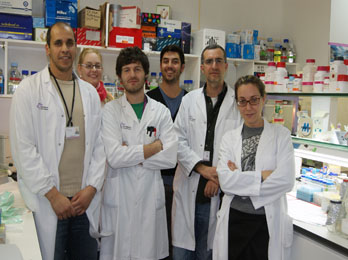VHIR Research Identifies New Colorectal Tumour Suppressor Gene

18/01/2012
The CIBBIM-Nanomedicine-Molecular Oncology group at Vall d'Hebron Research Institute (VHIR) affiliated to the UAB International Campus of Excellence identified the role of a gene MYO1A - producer of the protein Myosin-Ia - in the appearance of colorectal cancer. This discovery places MYO1A in main position in relation to colorectal tumours, up to the point of being a suppressing gene of the tumour capable of modifying the survival of patients and operating as a forecasting factor. Patients with low levels of the Myosin-Ia protein are more prone to acquiring the disease and have a lower survival rate (less than one year) when compared to patients with high levels of Myosin-Ia in the tumour who have survival rates of 9 years or more. The results of the study conducted by VHIR was published in the journal Proceedings of National Academy of Science (PNAS).
"What seemed like a gene with a merely structural role with little importance has been key in the differentiation of the cells of colorectal tumours", explains Dr Diego Arango, responsible for this study and head of the CIBBIM-Nanomedicine-Molecular Oncology group at VHIR. It is frequent to find MYO1A mutations (in 32% of tumours). Therefore, when this gene alters and becomes inactive, there is a loss in the capacity of differentiation of epithelial cells, which translates into low levels of Myosin-Ia, a more rapid tumour growth and a worse forecasting of patients because they have a lower survival rate. Up to date it was thought that the loss of Myosin-Ia was consequence of the tumour progression, and nevertheless, one of the most surprising results of the study is the demonstration that the inactivation of MYO1A is a direct cause of the loss of cellular differentiation and, therefore, contributes directly to the formation of the tumour", comments Dr Arango. "MYO1A is the driver of the process and not a simple passenger", clarifies Dr Arango.
The research, directed by the CIBBIM-VHIR Molecular Oncology Group, with the collaboration of other institutions such as CIBER-BBN (Bioengineering, Biomaterials and Nanomedicine), Yale University, the Ludwig Institute (Australia), Biomedicum Helsinki (Finland), and the University of Heidelberg (Germany), was carried out in vitro in search of the presence of this protein in locally advanced tumour samples without metastasis and with ganglion affectation (stage 3). The analyses were repeated later in animal models with the aim of characterising the tumour suppression mechanism and studying how low and high levels of Myosin-Ia directly affected tumour progression and survival rates. Data was contrasted with the clinical evolution of colorectal patients, confirming differences in survival rates and disease-free periods.
These findings presently do not represent a change in the clinical approach taken in colorectal tumours. Nevertheless, Dr Arango explains that "right now we must validate these findings in larger studies, but there is much hope in the fact that identifying the Myosin-Ia protein's new defining role will contribute to detecting which patients with locally advanced colorectal cancer can be cured by surgically removing the cancer, and which are in danger of a relapse”. This information will be confirmed with data from other markers. According to research results, however, there is proof that low levels of Myosin-Ia in tumour cells "justify the aggressiveness of post-operational chemotherapy given that a more than a significant percentage of patients continue to develop the disease", Dr Arango affirms.
Image: Research team from left to right: Dr Hafid Alazzouzi, Sarah Bazzocco, Rocco Mazzolini, Paulo Rodrigues, Dr Diego Arango and Elena Andretta.